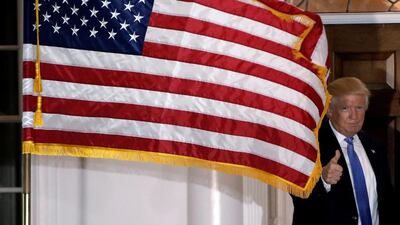The campaign for the UK to leave the European Union and Donald Trump's bid for the American presidency both brought to popular usage the word "post-truth", a word denoting appeals to emotion rather than to facts.
But post-truth claims are not limited to the right wing of the political spectrum. Mr Trump's campaign promises to build a wall along the Mexican border and deport tens of millions of undocumented workers are merely the flip side to Bernie Sanders’s hand-waving pledge to break up the banks. Both would be immensely complicated politically and logistically and neither candidate bothered too much with the details. They didn't have to: the mere "feeling" that it was the right thing to do was enough for their supporters.
After both Brexit and Mr Trump's win, there has been an attempt to understand the post-truth phenomenon in western democracies. One rather comforting delusion is to believe that western democracies are inoculated against post-truth because of stronger institutions, freer media and independent judges. But in fact democracies are even more vulnerable to the worldwide wave of post-truth.
One major reason is the media. Since Mr Trump's victory, there has been an attempt to co-opt the views of his more extreme supporters, by seeking to "understand" their positions and debate them. The same attempt was made for years in the name of "balance" – pitting one proponent of a wacky claim against a representative of an institution or someone with genuine knowledge of the facts. The result merely helped the wacky side, by normalising views that should have been beyond the pale.
What the established – and establishment – political and media class in the West has not grasped yet is that, for large numbers of people, facts no longer matter. Attacking the more fantastical inventions of post-truthers means nothing: the rhetoric feels true and undercutting their facts cannot change that.
Post-truth is often called propaganda, but what is happening is much worse than mere propaganda. Propaganda aims to create a particular view of the world, a view that is often at least internally coherent. But post-truth is different. It is nihilistic in its complete rejection of truth or empirical facts. There is no coherent world view to post-truth – it is more an anti-philosophy, one that suggests that facts don't matter at all, and any reality can simply be wished into existence through assertion. This is the real danger of the post-truth phenomenon and why it is so dangerous for democracies in particular.
Democracies have invested considerable time in creating institutions of truth, institutions that are separate from politics. An independent judiciary, universities that pursue free inquiry and science, broadly free media – all of these serve as a check on the worst impulses of politicians.
But post-truth undercuts all of them. Post-truthers deride media as partisan, universities as too political and judges as interfering in what "the people" want. Who then can counter whatever a popular politician chooses to say?
(That particular danger does not exist in states where the public have more experience of outright propaganda such as communist and post-communist states. There the public are so used to being lied to that they naturally distrust the stories they are fed. In a sense, they are inoculated against post-truth lies.)
The real heart of the post-truth attitude is the manufacture of doubt. On many of the big questions of the moment, such as climate change and immigration, the science and the economics are settled. But what post-truthers have done is introduce doubt, so that objective facts are hard to come by.
In the Middle East, this technique is most familiar from the Syrian civil war and the Israeli-Palestinian conflict, both battles in which, while the facts are discernible, supporters of all sides have spent much time provoking doubts. For them, there is no authority – not carefully compiled evidence, not international law – that can contradict their claims from the gut.
The real problem with post-truth is that no one controls it. Brexiteers and Trump supporters may have made best use of it, but they cannot stop the tide. The waves of post-truth cannot be controlled and the establishments of the West will struggle most to be heard in this era.
Mr Trump will very soon find this out the hard way: any attempt to disagree with the wisdom and "truth" of the crowds will lead to accusations that he himself, the great truth teller, has been compromised. There is a reason why post-truth finds such a home among conspiracy theorists: like any solid conspiracy theory, it is self-reinforcing. Facts from the outside world cannot break through – the facts themselves are assimilated. Once exposed to the population, post-truth, like a virus, replicates itself until it finally burns out.
All of this is particularly concerning for democracies, whose citizens are more "primed for truth", so to speak: they are more willing to accept reasonable seeming facts. The more the political and media class seeks to co-opt post-truthers and tell their story with balance, the more they will find that post-truthers always have the upper-hand. Those whose words are rooted in a reality are no match for those who can create multiple realities merely with words.
falyafai@thenational.ae
On Twitter: @FaisalAlYafai


